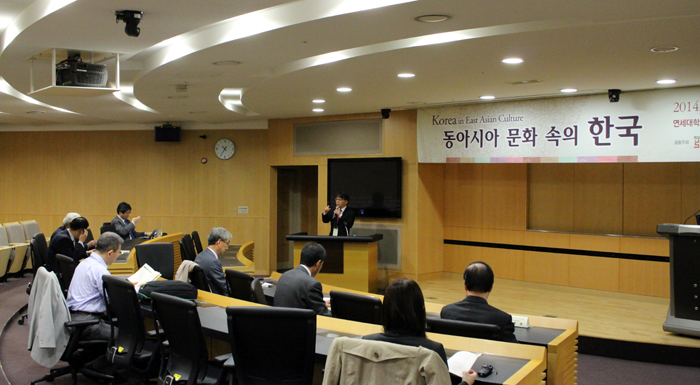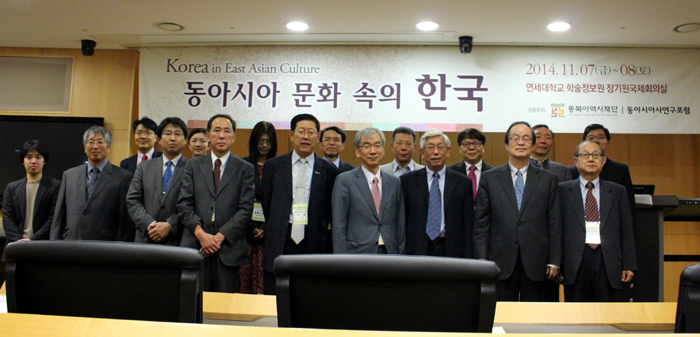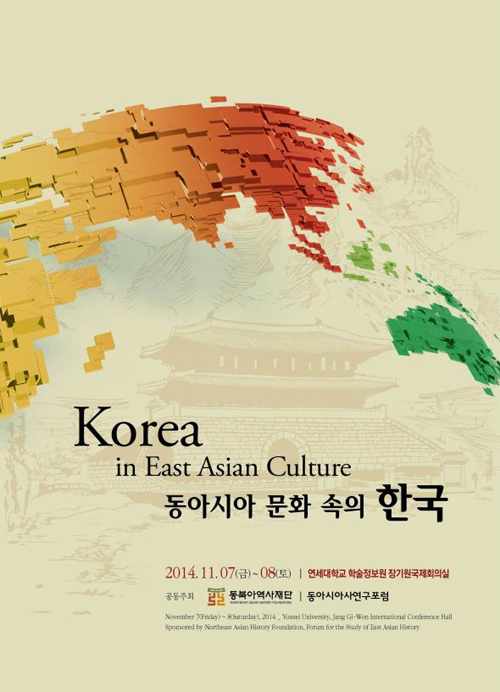How do East Asian countries and territories, such as mainland China, Japan and Taiwan, view Korea and its culture?
To find out the answer, the Northeast Asian History Foundation and the Forum for the Study of East Asian History co-hosted an international conference on November 7 and 8 titled “Korea in East Asian Culture.”
The conference was held as part of the annual meetings hosted by the Forum for the Study of East Asian History, an organization launched in 2007 by scholars in Korea, China, Japan and Taiwan.
The first session aimed attention at the subject of, "Korean Culture Represented in Ancient East Asia -- A Study of Korean Literature." It began with a talk by Fudan University (復旦大) Professor Shao Yiping (邵毅平) from China.
Shao spoke about the 17th century novel "The Cloud Dream of the Nine" (九雲夢) from Joseon times, describing scenes from the novel while outlining their meaning.
"The Cloud Dream of the Nine,” penned by Kim Man-jung (金萬重, 1637-1692), has recently been back in the spotlight across China, since it was shown in the smash-hit soap opera “My Love From the Star.” In the TV show, the lead male, Do Min-joon, a character who won over the hearts of many Chinese fans, called the novel, “a book of life.”
The professor went on to explain how the Shanghai Ancient Books Publishing House translated and published Do Min-joon’s "book of life" for the Chinese market in March this year. More than 17,000 copies have been printed in two separate runs as of June this year. Its popularity shows no signs of abating, he said.
Rave reviews from Chinese readers are flowing in. Shao gave a few of them as examples, such as, “How beautiful each sentence is in this book, written in Hangeul and Chinese by a scholar from our neighboring country,” and, “The writing style and scenes in this book are just as good as those in our ancient Chinese novels.”
The professor praised writers like Kim Man-jung as, “literary persons of talent,” armed with brilliant knowledge of both Hangeul and Chinese characters. In addition, he also said that although the recently published simplified Chinese volume has been much read across mainland China, he regrets the fact that there are still no versions that offer a deep explanation of the text. He said that more efforts should be made to fully understand this masterpiece.


The final session featured discussions on “Negative perceptions of Hallyu, or the Korean Wave, and cultural exchanges in 21st century East Asia.” During the talks, participants looked critically at what influence Korean pop music and TV shows have had on the flow of popular culture across the region and how it has contributed to building peace across East Asia.
Zhejiang University (浙江大) Professor Chen Hongmin (陳紅民) from China delivered a speech about “Impressions of Korea" (浮光掠影的 '印象韩国). In the speech, the professor presented his critical thoughts on common perceptions in mainland Chinese society about the Hallyu phenomenon sweeping across the country, using as an example some comments about Korea made between guests on the Chinese dating TV show “Don't Interrupt If You're Not Serious" (非誠勿擾) (unofficial translation).
“There is basically a good side to the Korean Wave which has a positive influence on China,” said Chen. "Korea has significantly grown in terms of style, the service industry, the fashion and entertainment industries and is particularly popular among Chinese youth, especially white-collar women. They are crazy about the country and its trends," he said.
“When we talk about the Hallyu phenomenon, we usually think of beautiful and romantic scenes from soap operas, or stories and good-looking actors and actresses from TV shows or pop bands. However, focusing solely on these kinds of dramas and music, you can't fully understand the historical or cultural background, the social development, issues and political systems in the country or the strong spirit of its people,” he said.
The professor agreed that such Hallyu content has served as a great introduction to getting more Chinese people interested in Korea, but he warned that, “If the current level of promoting Korea continues to stay low like this, it could cause ‘misunderstandings’ about the country and foreign audiences might feel ‘disenchanted' or feel ‘cheated' when they see the ‘real Korea.’”

By Wi Tack-whan, Sohn JiAe
Korea.net Staff Writers
whan23@korea.kr
To find out the answer, the Northeast Asian History Foundation and the Forum for the Study of East Asian History co-hosted an international conference on November 7 and 8 titled “Korea in East Asian Culture.”
The conference was held as part of the annual meetings hosted by the Forum for the Study of East Asian History, an organization launched in 2007 by scholars in Korea, China, Japan and Taiwan.
The first session aimed attention at the subject of, "Korean Culture Represented in Ancient East Asia -- A Study of Korean Literature." It began with a talk by Fudan University (復旦大) Professor Shao Yiping (邵毅平) from China.
Shao spoke about the 17th century novel "The Cloud Dream of the Nine" (九雲夢) from Joseon times, describing scenes from the novel while outlining their meaning.
"The Cloud Dream of the Nine,” penned by Kim Man-jung (金萬重, 1637-1692), has recently been back in the spotlight across China, since it was shown in the smash-hit soap opera “My Love From the Star.” In the TV show, the lead male, Do Min-joon, a character who won over the hearts of many Chinese fans, called the novel, “a book of life.”
The professor went on to explain how the Shanghai Ancient Books Publishing House translated and published Do Min-joon’s "book of life" for the Chinese market in March this year. More than 17,000 copies have been printed in two separate runs as of June this year. Its popularity shows no signs of abating, he said.
Rave reviews from Chinese readers are flowing in. Shao gave a few of them as examples, such as, “How beautiful each sentence is in this book, written in Hangeul and Chinese by a scholar from our neighboring country,” and, “The writing style and scenes in this book are just as good as those in our ancient Chinese novels.”
The professor praised writers like Kim Man-jung as, “literary persons of talent,” armed with brilliant knowledge of both Hangeul and Chinese characters. In addition, he also said that although the recently published simplified Chinese volume has been much read across mainland China, he regrets the fact that there are still no versions that offer a deep explanation of the text. He said that more efforts should be made to fully understand this masterpiece.


The Northeast Asian History Foundation and the Forum for the Study of East Asian History co-host a global conference about Korea in East Asian culture on November 7 and 8.
The final session featured discussions on “Negative perceptions of Hallyu, or the Korean Wave, and cultural exchanges in 21st century East Asia.” During the talks, participants looked critically at what influence Korean pop music and TV shows have had on the flow of popular culture across the region and how it has contributed to building peace across East Asia.
Zhejiang University (浙江大) Professor Chen Hongmin (陳紅民) from China delivered a speech about “Impressions of Korea" (浮光掠影的 '印象韩国). In the speech, the professor presented his critical thoughts on common perceptions in mainland Chinese society about the Hallyu phenomenon sweeping across the country, using as an example some comments about Korea made between guests on the Chinese dating TV show “Don't Interrupt If You're Not Serious" (非誠勿擾) (unofficial translation).
“There is basically a good side to the Korean Wave which has a positive influence on China,” said Chen. "Korea has significantly grown in terms of style, the service industry, the fashion and entertainment industries and is particularly popular among Chinese youth, especially white-collar women. They are crazy about the country and its trends," he said.
“When we talk about the Hallyu phenomenon, we usually think of beautiful and romantic scenes from soap operas, or stories and good-looking actors and actresses from TV shows or pop bands. However, focusing solely on these kinds of dramas and music, you can't fully understand the historical or cultural background, the social development, issues and political systems in the country or the strong spirit of its people,” he said.
The professor agreed that such Hallyu content has served as a great introduction to getting more Chinese people interested in Korea, but he warned that, “If the current level of promoting Korea continues to stay low like this, it could cause ‘misunderstandings’ about the country and foreign audiences might feel ‘disenchanted' or feel ‘cheated' when they see the ‘real Korea.’”

The official poster for the Korea in East Asian Culture conference.
By Wi Tack-whan, Sohn JiAe
Korea.net Staff Writers
whan23@korea.kr